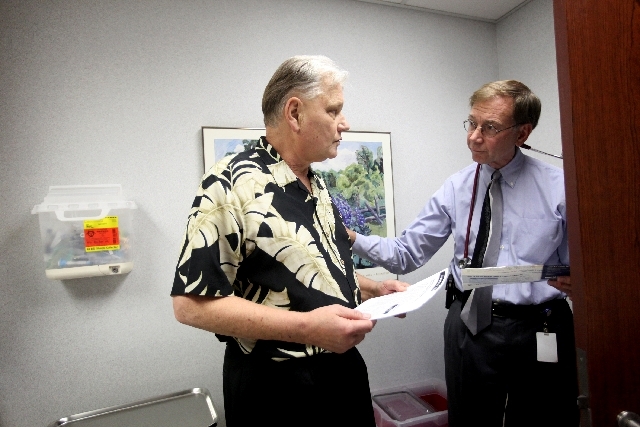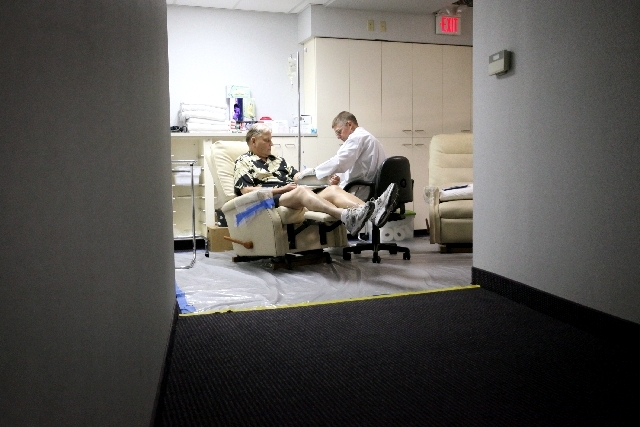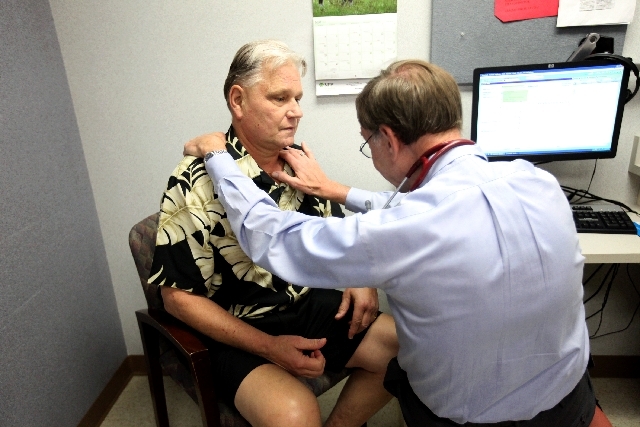Doctor drawing experimental cancer drugs to Las Vegas



It was the spring of 2012 and Lynn Leany, a 71-year-old Las Vegan who compared the pain of his cancer to having someone push an ice pick into your shins, figured it was time to meet his maker.
The retired multimillionaire businessman, whose stage 4 prostate cancer had spread deep into his bones, didn’t even have the strength to walk 30 feet. Sitting became excruciatingly painful. So did standing. And lying down. Even breathing.
And then Dr. Nicholas Vogelzang, the renowned researcher-clinician who had kept Leany alive over a five-year span by using new drugs that showed promise, decided to place him on a drug called radium-223 at Comprehensive Cancer Centers of Nevada.
Administered through an IV, the medication delivers radiation to the bone and prostate cancer tumor.
Three weeks later Leany was playing golf. Without pain.
Last July, Leany told the Review-Journal how fortunate he and Las Vegas were to be one of only three sites in the United States to participate in a trial of the drug that had great success in Europe, increasing survival by five months.
“It’s giving me and other men a chance at life we wouldn’t have had otherwise,” he said.
A month ago that trial became standard of care, the Food and Drug Administration approved radium-223 for treatment of advanced prostate cancer.
Hard work by researchers around the world is paying off more frequently today, Vogelzang noted recently as another of his patients, Craig Becker, prepared to receive the new drug at the Comprehensive Cancer offices off Eastern Avenue.
“We’re getting more and more tools to use,” the former head of the University of Chicago Cancer Research Center said.
It isn’t an accident that trial drugs for the treatment of prostate, kidney, bladder and testicular cancers –– medications that can mean the difference between life and death –– now come to Las Vegas before they’re on hand at many of the nation’s prestigious academic medical centers, according to Dr. Cy Stein, chairman of the department of medical oncology and therapeutics research at the City of Hope Cancer Center in Los Angeles.
“Research firms seek Dr. Vogelzang out because of the 30 years of invaluable research work he has put into the field,” Stein said. “His opinion is that valued. There is simply no way that Las Vegas would be getting these trials without his stature in the field.”
Stein remembered how a fledgling biotech firm he was associated with, Tokai, decided on Las Vegas as the site of a clinical trial.
“His name simply immediately came to mind,” he said. “It was like his name was on the marquee for Las Vegas.”
The idea of the 63-year-old Vogelzang as a superstar whose very name can induce some of the world’s boldest entrepreneurs to bring their products to Las Vegas for a tryout –– millions of dollars are generally invested in a drug and most attempts fail –– undoubtedly will seem strange to many in Southern Nevada. At first glance, his power isn’t noticeable. In fact, his upper body tilts forward stiffly, a side effect of the radiation he received in the ’80s to treat Hodgkin’s disease, a cancer of the lymphatic system. And yet the more you think about Vogelzang’s arrival here in 2004 after two decades at one of the world’s top academic cancer centers in Chicago, the more it doesn’t seem strange at all that the world’s best research companies gravitate to him.
Vogelzang got caught up in the dream of Nevada Cancer Institute founders Heather and Jim Murren, who hoped to build a world-class research and treatment center here in the image of the MD Anderson Cancer Center in Houston. Although the institute’s 2011 bankruptcy and subsequent closing have caused many to speculate whether such a dream was ever grounded in reality in Nevada, where reliable government funding couldn’t be counted on, no one has ever questioned whether Jim Murren, chairman and CEO of MGM Resorts International, can recognize a huge talent when he sees it.
Vogelzang had regularly lectured at conferences in Paris, London and Vienna and assisted in creating clinical trial designs as a member of 10 pharmaceutical advisory boards.
Even more important , he also helped develop therapies for kidney cancer, bladder cancer, testicular cancer, prostate cancer and mesothelioma, an asbestos-caused cancer of the lining of the chest, abdomen or heart.
His research into the drug mitoxantrone helped open the door to its 1996 FDA approval as the first nonhormonal therapy for the treatment of prostate cancer. The drug itself didn’t make a huge difference for patients, but researchers say it made a big difference in prostate cancer research, helping investigators develop taxanes, or chemotherapeutic drugs, that stop cell division.
As the principal investigator for pemetrexed disodium, a drug used in tandem with cisplatin –– a platinum-containing anti-cancer drug –– to combat mesothelioma, he developed a multicenter, randomized drug trial that led to 2004 FDA approval of the drug. To this day, it remains the standard of care for a form of the disease.
He also served on the advisory board for, and contributed to studies that led to the 2011 FDA approval of the hormonal treatment Zytiga for prostate cancer. His involvement and enthusiasm for the latest clinical research into use of cabozantinib, already approved for the treatment of thyroid cancer, indicates it won’t be long before it’s also used to reduce pain and bone destruction caused by prostate cancer.
So on the scientific and academic stage, Vogelzang undoubtedly was, and is, a superstar. A beautiful mind. While selling him on Las Vegas, the Murrens treated him like a Hollywood celebrity, a far cry from the polite applause and writeups in scientific journals he received when he presented a research paper. Wined and dined by chefs he had read about, he went to the best of Las Vegas by limousine. The best seats to see the iconic rock band the Eagles weren’t a problem. Neither were supportive discussions with then Gov. Kenny Guinn, Mayor Oscar Goodman and U.S. Sen. Harry Reid.
It was “heady stuff” to Vogelzang, whose talks with politicians convinced him the new cancer institute was too big to fail. Couple that conclusion with what was then a recent divorce and remarriage and Vogelzang said it’s not surprising that at the age of 55 he was ready to try something new.
Soon after his arrival in 2004, drug makers wanted to test new drugs through the Nevada Cancer Institute because of him. That added to the institute’s scientific pedigree, was good news for Nevadans, but it didn’t do much for the bottom line of the fledgling institution, which had few patients and no hospital to bring in money. The dream of an MD Anderson-kind of facility in Nevada needed the steady stream of millions of dollars that the Texas institution received from its oil rich Lone Star state government.
Five years after Vogelzang became the first director of the cancer institute, Heather Murren replaced him with someone supposedly better attuned to finances. That, too, as it turned out, was a dream not grounded in reality.
Devastated, Vogelzang considered offers from the most exclusive academic cancer research centers in the country. But he had been touched by community support in 2006 when his 18-year-old daughter was killed in a car wreck. He decided to call Las Vegas home, taking a position as developmental therapeutics medical director for U.S. Oncology, the medical consortium that provides care to thousands of cancer patients nationwide and does business locally as Comprehensive Cancer Centers of Nevada.
Given that Comprehensive Cancer Centers already accessed many clinical trials of cancer drugs through its affiliation with the celebrated Jonsson Comprehensive Cancer Center at UCLA, its new affiliation with Vogelzang means the group, which treats 25,000 patients a year at eight centers, offers more cutting edge treatment than available in most American cities.
Vogelzang works 14-hour days with Comprehensive Cancer Center, where he sees about 100 patients a week, men that include Craig Becker of Colorado, Joseph Reinhardt of Southern Nevada and New Mexico’s Mark Wilson, all of whom are receiving radium-223.
Although born in Holland, Mich., Vogelzang, brought up in the Christian Reformed Church faith, spent most of his boyhood in Utah, where his family moved to start a school, churches and a mission for Native Americans.
A graduate of Trinity Christian College in Illinois and the University of Illinois Abraham Lincoln School of Medicine, Vogelzang began his research career specializing in treatments for lung cancer. But when he was recruited by the University of Chicago, where a lung cancer specialist was already onboard, he shifted his research to testicular, prostate, bladder and kidney cancer, subjects that he has now addressed in more than 500 scientific papers.
Vogelzang’s patients often marvel that even when he’s at a conference out of the country –– Becker calls him “unbelievably caring” –– he gets back to them within a couple of hours, answering their questions by email if he can’t do so by phone.
“I was the oldest of seven children and my father told me to always do things right,” Vogelzang said as he went through paperwork in his office. “I always tell patients, ‘If you want to fight this cancer, I’ll fight alongside you.’ I think as the oldest you always must be responsible even to a fault.”
He still gets excited by his work, growing louder and louder as he remembered how he first realized that radium-223 could be beneficial to patients.
“After I had given it to a patient, a month later his pain was gone!” he said. “Two years later, he was still alive and this was a stage 4 cancer patient. I realized we really had something!”
As excited as he is by radium-223’s ability to keep patients alive longer and to erase their pain –– it can cause nausea and fatigue in some patients–– he never forgets that it’s not a cure.
In May, Lynn Leany, whose company provided the reinforcement steel for casinos that include Mandalay Bay and Treasure Island, died after the radium-223 no longer worked. Diagnosed with prostate cancer in 1994, he was cancer free until the disease came roaring back about five years ago.
During the five years that Vogelzang kept finding new drugs, including radium-223, to keep Leany and other stage 4 cancer patients alive, the doctor had another cancer patient on his mind, his wife, Diane. Fortunately, she overcame a sarcoma found in her left thigh, a malignant soft tissue tumor that was treated with chemotherapy, radiation and surgery.
Today, Vogelzang always keeps notes close by that Leany wrote him a few months before his death:
Dr. Vogelzang, … I am feeling much better and in very little pain, if any. You pulled another rabbit out of the hat. Another trick by Nick. … I believe that our good Lord sent me to you and your care and I love knowing that you are truly concerned for me, my life and quality of my life. … I don’t know how much time I have left here on this earth but I know in my heart that you will continue to administer the latest and best treatment for me. … THANK YOU and love you for what you are doing for me. — Your friend L.M. Leany
Contact reporter Paul Harasim at pharasim@
reviewjournal.com or 702-387-2908.












